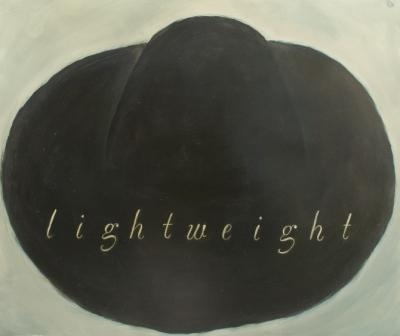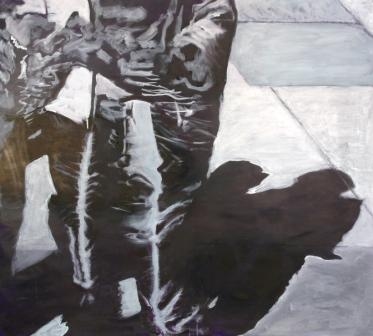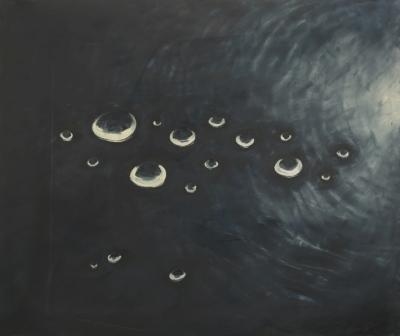Men Can Take It
Based on a book I found in the Prelinger Library in San Francisco. The original book from 1933 is a sort of men’s self-help volume. I copied the index page of illustrations (by James Thurber) without having seen them. I ran the illustration titles through a Google image search and chose images out of the top 100 hits. Then, I photocopied these, projected and painted them. The distance imbedded in the process leaves the skeletons of the original images intact, but reduces other information. This process, much of it taking place in the literal dark, seemed an apt metaphor for my induction into the tribe of late 20th Century US maledom. I would argue that the whole construction of identity (and art) is a Stipulative Definition.
• From Wikipedia. A stipulative definition is a type of definition in which a new or currently-existing term is given a new meaning for the purposes of argument or discussion in a given context. When the term already exists, this new definition may, but does not necessarily, contradict the dictionary (lexical) definition of the term. Because of this, a stipulative definition cannot be "correct" or "incorrect"; it can only differ from other definitions, but it can be useful for its intended purpose.
Based on a book I found in the Prelinger Library in San Francisco. The original book from 1933 is a sort of men’s self-help volume. I copied the index page of illustrations (by James Thurber) without having seen them. I ran the illustration titles through a Google image search and chose images out of the top 100 hits. Then, I photocopied these, projected and painted them. The distance imbedded in the process leaves the skeletons of the original images intact, but reduces other information. This process, much of it taking place in the literal dark, seemed an apt metaphor for my induction into the tribe of late 20th Century US maledom. I would argue that the whole construction of identity (and art) is a Stipulative Definition.
• From Wikipedia. A stipulative definition is a type of definition in which a new or currently-existing term is given a new meaning for the purposes of argument or discussion in a given context. When the term already exists, this new definition may, but does not necessarily, contradict the dictionary (lexical) definition of the term. Because of this, a stipulative definition cannot be "correct" or "incorrect"; it can only differ from other definitions, but it can be useful for its intended purpose.











